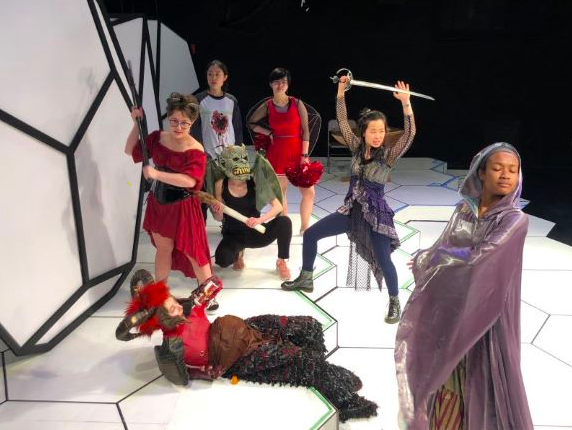In Fall 2019, the Wellesley College Theatre Department is piloting a new program in which student actors can gain credit for working on or acting in their mainstage production. Having performed in the Spring 2019 production of “She Kills Monsters,” I wholeheartedly support this policy change.
“She Kills Monsters” by Qui Nguyen is a monster of a show. Part comedy, part tragedy, with a whole lot of heart, the play tells the story of a young woman, Agnes Evans, learning about her late younger sister who she barely knew through the lens of Dungeons and Dragons (D&D). The Theatre Department went all out, hiring a professional stage choreographer, renting elaborate costumes and building a life-size D&D board. The show included the roughly 15-person cast wielding swords, blowing up fairies, slapping each other across the stage, attacking bugbears and, of course, competing in dance-offs.
The play ended in a boss battle with my character, Agnes, fighting a five-headed dragon, each head controlled by a student like a giant marionette doll with glowing eyes. After ducking from dragon jaws, fending off the head with her shield, throwing cuts with the sword and tumbling backwards to avoid being dragon food, Agnes slays the dragon and reaches peace with her younger sister’s life and death.
It was epic.
Taking my macroeconomics midterm the next morning: not quite so epic.
It should come as no surprise that acting in a semi-professional production while attending one of America’s top liberal arts colleges requires a precarious balance. Fighting the five-headed dragon was an analogy for how student actors manage their semesters, struggling to keep the five heads of classes, part-time jobs, acting, social life and sleep in line, making sure none of them sneak up and bite you.
This has not gone unnoticed by the Theater Department. This fall the department is piloting a program for students who act or work on a fall show to gain class credit, a policy change I support for multiple reasons.
First, it acknowledges the commitment student actors give. At Wellesley, a single class is said to have the expected commitment of 10 to 12.5 hours a week. With the 11-hour rehearsal times, including Friday nights and weekends, acting in a play is easily just as rigorous as a class. The 20-hour tech weeks or show weeks are even more strenuous. Second, it encourages interested students who can’t make the time commitment. The heavy time commitment is enough reason for many students who may love and enjoy theater to opt-out. This program gives students the incentive they need to take on an experience they might have always wanted an excuse to try. Third, it includes a new method of learning. You cannot learn many of the lessons theater teaches you in the classroom.
Theater includes some of life’s biggest transferable skills: teamwork, communication, collaboration, taking risks, creativity, confidence, analysis, focus, memory, trust, etc.
Yes, some classes include public speaking in which you typically speak to a room of about 30 people for 15 minutes. This is very different from, say, putting on a demonic cheerleader costume, ripping someone’s arm off and using said arm as a weapon, all while evilly cackling and looking like you absolutely love it as you go into a killer back handspring.
Yes, classes include group project work. Still, you do not know teamwork and trust until you eagerly go on stage every show and on four different occasions die by cast members choking you, throwing a knife into your chest, being consumed by an evil jello mold and literally ripping your heart out while trusting you’re not going to get a black eye.
Yes, reading a book and writing an essay will teach you literary analysis, but when you actually have to be and live the character, learning subtle meanings behind their lines, tracking their emotional state and growth, deciding how they walk and how they would talk, analyzing character relationships and empathizing with the character to the point that you yourself can display their emotions, you’ll find a heightened immersive experience on literary analysis.
One concern for this policy is the reduced rehearsal time it would cause. Producing a show is a very lengthy process. The general rule of thumb is that every minute of a play requires one hour of rehearsal. By this rule, your typical 90-minute show will take 90 hours of rehearsal or nine 10-hour weeks at least.
However, I still believe the quality could be maintained so long as the time spent during rehearsals is efficient. Personally, I am not a fan of theater games or warm-ups and think cutting them by half could add valuable time. Gaining feedback from actors could also help time be dedicated to sections which need it most. Actors can also work on scenes independently of rehearsal.
I would also be interested in how this program could give more than just credit for theater. Could a show fulfill the PE requirement? The mere two hours a week I spent hitting golf balls in beginner golf was nothing compared to the physical training like stretching, fencing, swordplay, choreography and stage combat that was involved for “She Kills Monsters.”
All-in-all, with recent show choices which have been more contemporary, timely, and popular with Wellesley students and the new for-credit pilot program, the Wellesley College Theatre Department is making progress in creating better experiences opportunities for student actors.



